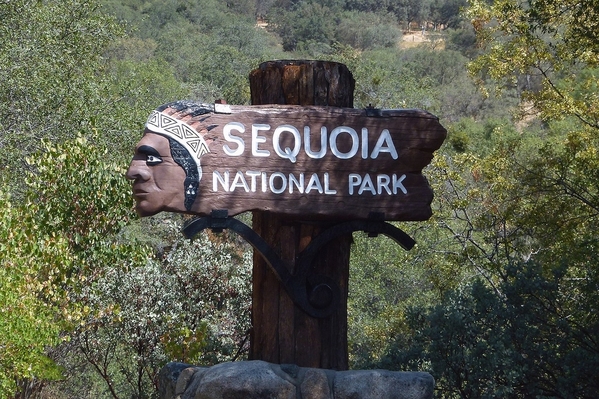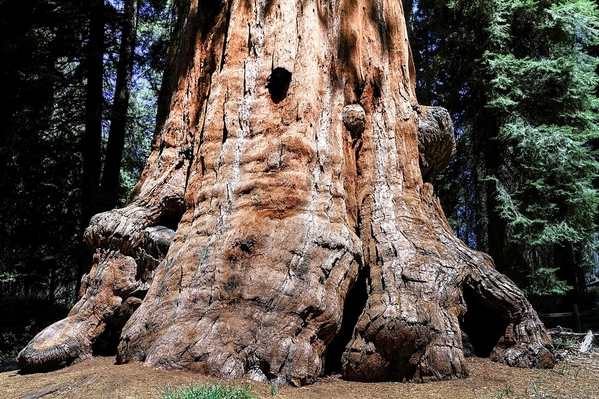Going back through my travel records, I was surprised to find that it's been almost 20 years since I last visited Sequoia National Park -- my, how time flies. I'm glad I spent a lot of time exploring this park during the 1980s and 1990s because it's a special place.

Sequoia NP was about a 4 hour drive from our home in Southern California (under ideal traffic conditions-- often more like 5 or 6 hours) and was one of the easiest to reach natural destinations near us, so we visited it almost every year. The park spans over 400,000 acres so it's impossible to see it all. It's part of the UNESCO Sequoia-Kings Canyon Biosphere Reserve (1976).
What's so special about the park? Lots, to be sure -- scenic drives, great hiking trails, beautiful waterfalls and mountains, and an assortment of wildlife. But the single most amazing thing is that it's home to the largest living things on the planet, namely the giant sequoia trees that we featured in our One Clue Mystery photo last Saturday. George G was the only one who recognized where we were visiting.
Sequoia trees were plentiful at one time but now there are just scattered groves remaining on the western slopes of California's Sierra Nevada mountains, the most accessible being here in Sequoia NP. Many of the groves are quite remote and hard to get to -- probably good for their survival and protection -- but there are some groves you can drive right up to and walk into.

Here are a few facts about the giant sequoia:
- They are not the tallest trees (those are the coastal redwoods)
- They are not the widest trees (baobob and Montezuma cypresses exceed them)
- They are not the oldest trees (those are the bristlecone pines)
- They are the largest living things on the planet (height of 286 feet (87 m) or more, a circumference of 113 feet (34 m) or more, an estimated volume of up to 52,500 cubic feet (1,487 m3), and an estimated life span of 1800–2700 years.
- They are among the fastest growing organisms on earth. A giant sequoia can grow 40 cubic feet in volume each year -- equivalent to a 50 foot tall tree one foot in diameter.
To walk among a forest of these giants is almost a spiritual experience -- so small does life seem in comparison. Besides their amazing size, I'm always fascinated at how old they are -- many of these trees were already huge when Jesus walked the earth. Many sequoias are scarred by burn marks from old forest fires (they are very fire and pest resistant). The trees have fairly shallow roots, and the erosion of their root system can be fatal to them, which is why you should stick to the designated walking trails when near them.
(General Sherman -- the largest living thing on Earth)
The best single place to experience sequoia trees is in the Giant Forest, where you'll encounter the General Sherman tree -- the most massive of the sequoias and as such the largest living thing on earth. In this same grove are another 4 of the 10 largest sequoia trees in the world.
Going through these images, I've a strong desire to get back to these mountains while I still am able to walk among these beheamoths. I suggest you do the same.
Some few final photos of Sequoia National Park from the good old days:
(a young DrFumblefinger carrying his 4 month old son -- now a young man 28 years old!)
(my lovely wife, dwarfed by The President)



Comments (0)